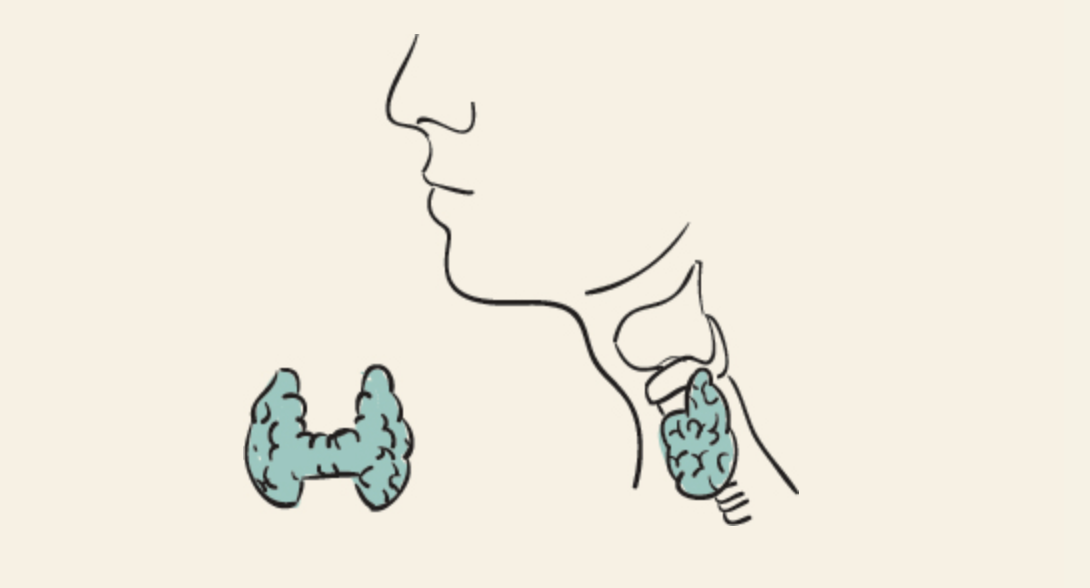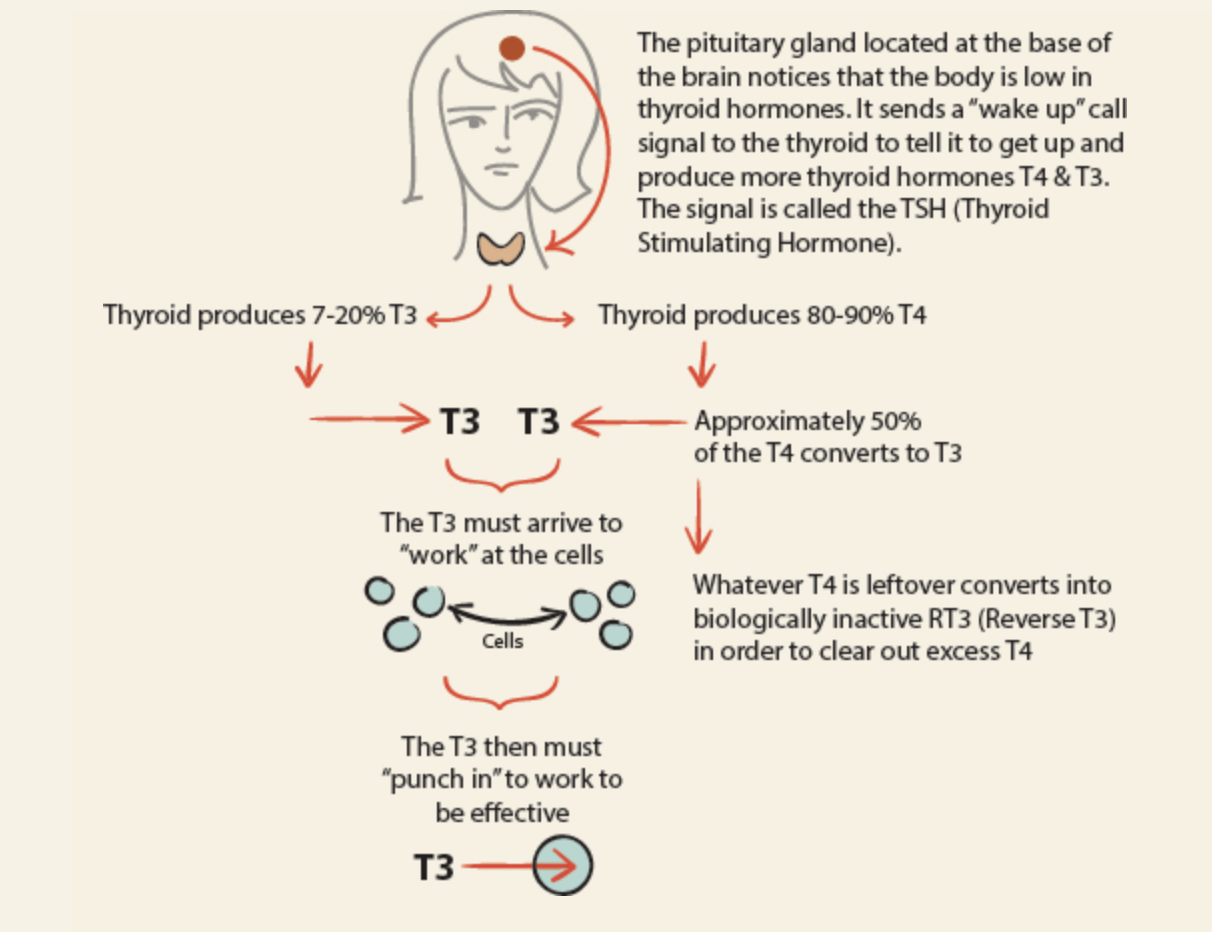The Devastating Health Effects of Untreated Hypothyroidism
Mar 06, 2023
I suffered from hypothyroidism for about 7 years of my life. It was miserable and I encountered multiple health issues that stemmed from it. Before you get frightened about what this could mean for you...let me tell you right off the bat that EVERY THYROID ISSUE IS FIXABLE, whether through natural means or through thyroid hormone replacement.
Because the thyroid is the master gland of the human body, a cascade of health problems can spawn from thyroid troubles. Thyroid hormones are not only responsible for the production and regulation of your sex hormones, they are responsible for your body temperature, heart rate, and much more.

First, let's talk about what thyroid hormones are. Thyroid hormones are hormones produced by the thyroid gland (a butterfly-shaped gland located at the base of your neck). Thyroid hormones play a critical role in your body, including controlling your metabolism (fat-burning capabilities), regulating your body temperature, and helping your organs work - basically everything!
There are two main types of thyroid hormone: T4 and T3. T4 is the more abundant type of thyroid hormone that the thyroid gland produces, but it is the inactive thyroid hormone and this is essential to understand. T4 is just a storage hormone for T3.
T4 IS JUST A STORAGE HORMONE - ITS JOB IS TO CONVERT ITSELF INTO ANOTHER HORMONE (T3).
T4 is useless unless it does it's job properly and converts to the active thyroid hormone T3 (meaning T3 is the form that does all the heavy lifting in your body). Sometimes T4 does not do it's job and this is when patients suffer at the hands of uninformed physicians. Sometimes T4 converts into the inactive form of T3, called Reverse T3 which is another hypothyroidism issue.

Let's look at some of the health atrocities caused by undiagnosed and/or untreated hypothyroidism:
- Weight Gain: One of the most common symptoms (and complaints) of untreated hypothyroidism is uncontrollable weight gain. I am 5'2" tall and when I had untreated hypothyroidism - I went from 115 lbs to 150 lbs while working out two hours a day and limiting calories. Hypo weight gain occurs because metabolism slows down when there is a lack of fat-burning thyroid hormone T3 (triiodothyronine) in the body. This can lead to obesity, insulin resistance, type 2 diabetes, and increase the risk of other health problems. (Source)
HOW NORMAL THYROID FAT-BURNING METABOLISM WORKS: The thyroid gland outputs mostly T4 and some T3. Your body converts the T4 into more T3. The T3 arrives at work (the cells). The T3 “punches in” to work (enters/affects the cells). A lot of things can go haywire with this process whether on thyroid hormones or not. (Source)
- Fatigue and Weakness: People with untreated hypothyroidism experience fatigue and weakness. This is because the body is lacking in the energy-giving, brain, and mood-enhancing life-sustaining thyroid hormone T3. Due to low T3, the body also cannot convert food into energy as efficiently as it should. Digestion is compromised. It is debilitating and makes every day hard to get through in this state of mental and physical exhaustion. (Source)
- Heart Problems: The heart needs the T3 thyroid hormone Hypothyroidism can also cause heart problems. It can increase the risk of heart disease, high blood pressure, and heart failure. So, when we say that the heart needs T3 thyroid hormone, what we mean is that the heart specifically needs the active form of the thyroid hormone to function properly. The thyroid hormone helps regulate your heart rate and your blood pressure, among other things - so if your body doesn't have enough T3 hormone, it can lead to problems with your heart. For example, if you have an underactive thyroid (hypothyroid) you might experience a slow heart rate, low blood pressure, and fatigue because your body doesn't have enough T3 to keep your heart working at the right pace. (Source)
- Depression: Hypothyroidism can also cause depression and when it does...once you fix the hypothyroidism, that symptom goes away. This is because the thyroid hormones play a role in regulating mood. Neurotransmitters are chemical messengers that transmit signals between brain nerve cells and other body parts. The balance of neurotransmitters in the brain is important for maintaining mood, cognition, and behavior. T3 thyroid hormone regulates neurotransmitter function in several ways. First, it affects the synthesis and release of neurotransmitters. For example, T3 increases the synthesis and release of serotonin, a neurotransmitter that is important for regulating mood and behavior. Second, T3 affects the sensitivity of neurotransmitter receptors. For example, T3 increases the sensitivity of the dopamine receptors, which are involved in reward and motivation, and the norepinephrine receptors, which are involved in attention and arousal. Third, T3 affects the reuptake and degradation of neurotransmitters. For example, T3 decreases the reuptake of serotonin, which allows more serotonin to be available in the synapse to bind to receptors and exert its effects. (Source)
- Joint Pain: Joint pain and stiffness is other common symptom of untreated hypothyroidism. This is because the lack of thyroid hormones can cause the joints to become inflamed. The exact mechanism by which hypothyroidism causes joint pain and stiffness is not fully understood, but it is thought to be due to the effects of thyroid hormones on joint health. Thyroid hormones help regulate the production of collagen, a protein that provides strength and structure to joints, and a lack of these hormones may lead to decreased collagen production and joint damage. Furthermore, low levels of thyroid hormones are in and of themselves an inflammatory state, which may cause inflammation in the joints, leading to pain and stiffness. Inflammation is a natural response of the body to injury or infection, but when it becomes chronic, it can lead to tissue damage and other health problems. (Source)
- Infertility/Miscarriages: Women with untreated hypothyroidism may have difficulty becoming pregnant. This is because the thyroid hormones are in charge of the production and regulation of sex hormones and affect ovulation and menstruation. If you can plan your pregnancy, ruling out thyroid issues beforehand is key. If you take thyroid hormone replacement for the treatment of hypothyroidism, pregnant people often need more thyroid hormones during pregnancy to meet the demands of the fetus and parent. (Source)
- Cognitive Decline: Hypothyroidism can also affect cognitive function. People with untreated hypothyroidism may experience memory loss, confusion, poor coordination, trouble with recalling words or pronouncing words correctly, and another cognitive decline. "Brain fog" is a term often used to describe how it feels to have a hypothyroid brain. (Source)
There are over 30 symptoms of hypothyroidism - I once suffered from almost all of them. Below is a list of hypothyroid symptoms from my book The Paleo Thyroid Solution.
- Cold hands/feet and generally being cold regardless of the weather or temperature, weak arms (Can be general weakness like not being able to hold something heavy for a long time and/or this might manifest as tendonitis or carpal tunnel syndrome.)
- Low energy and stamina
- Serious depression or general malaise (Aside from sadness and despair, hypo-depression sometimes manifests as the feeling of being paralyzed with a lack of motivation and being unable to do anything about it, even though you know something is wrong with you. It’s like you just can’t seem to take action to help yourself.)”
- Needing a nap every day
- Constipation
- Sluggish reflexes (I became very clumsy and would knock over everything and bump into everything, even though I am an extremely coordinated person in general.)
- Dry cracked skin (On heels, ankles, and sometimes it shows up on the inside edge of an index finger and looks like very dry, scaly, cracked skin.)
- When touched or pulled, hair feels like a rubber band (Yet it breaks easily.)
- Hair loss
- Loss of curliness in curly or wavy hair
- Inability to focus and concentrate (Extremely difficult to read, learn, or sustain mental focus, even while watching a film or a TV show. One has to reread paragraphs to retain the information. Someone could be talking to you and you can barely understand what they are saying and/or you instantly forget what they just said.)
- Mixing up words in speech (sort of like dyslexia of the mouth) and difficulty remembering words (Not being able to speak properly or get the words out correctly.)
- Lower/deeper voice or scratchy/raspy voice
- Brain fog and forgetfulness
- Menstrual irregularities such as heavy bleeding, constant bleeding, uterine fibroids/polyps, polycystic ovary syndrome (PCOS), miserable and long-lasting PMS
- Unhealthy cholesterol results
- Low body temperature (details on page 86)
- Uncomfortable feeling in the throat/neck area (Feeling “choked up,” similar to when you are about to cry or when you feel like you can’t speak in a stressful situation, that “lump in your throat” feeling. Difficulty swallowing, constantly clearing one’s throat, and/ or not wanting clothing to cover or touch the neck.)
- Digestive problems (gas, abdominal bloating)
- Problems at work or the inability to function well at work
- Relationship issues with family/friends, romantic partners, and/ or colleagues, etc.
- Increased or uncontrollable cravings for sugar and carbohydrates
- Allergies (rare allergies are often related to untreated or mistreated Hashimoto’s)
- Messy handwriting (Issues with brain-hand-muscle dexterity can lead to messy handwriting; it feels hard to get the words from your brain through your hand onto the paper.)
- Heart palpitations (Especially when lying down, it feels as though your heart is pumping and thumping loud and strong in your chest and you are “aware” of your heartbeat like never before, and it feels scary. Often related to adrenals and/or low iron.)
- Restless legs, the uncontrollable compulsion to continually readjust one’s legs (Feels like you cannot find a comfortable position)
- Swelling and inflammation
- Puffy eyes and face upon waking, and a general feeling of overall puffiness and bloat
- Myxedema (Swelling of the skin and underlying tissues is typical of patients with underactive thyroid glands. Discoverable by visual assessment and not being able to pinch a minuscule bit of skin on the outside of your arms, near your shoulders. Instead one is only able to pinch a thick, large portion of skin.)
- Stomach fat and a growing “tire” around your waist (thyroid and adrenal related)
- Headaches
- Constant thirst and water won’t quench it
- Feeling as if something wrong is happening to your brain as if you are getting “dumb” and losing your cognitive abilities
- Anxiety attacks
Untreated hypothyroidism can have serious consequences for your health. The good news is - every thyroid issue is fixable! Whether achieved through natural methods or by using thyroid hormone replacement...you can end the suffering. Don't let years of your life pass you by due to untreated thyroid issues.
About the author: Elle Russ is the #1 bestselling author of The Paleo Thyroid Solution, a world-renowned thyroid health expert, and master coach.
Take her Thyroid Masterclass HERE
Sign Up For My Newsletter!
I hate SPAM. I will never sell your information, ever.

